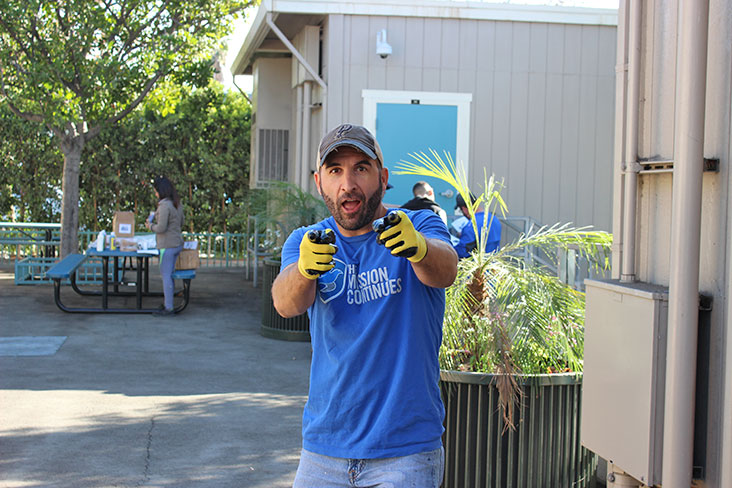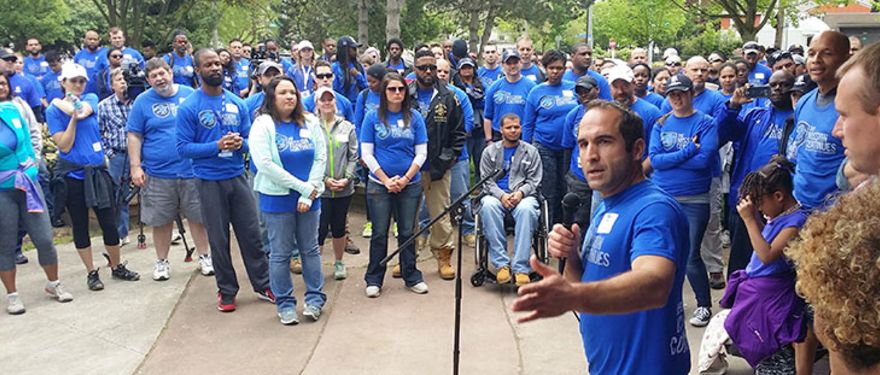About the HBS/HKS Joint Degree Program
The HBS/HKS joint degree programs serve a growing need of critical importance to global society: their mission is to develop leaders, skilled in management and the shaping of innovative public policy, who will assume positions of influence spanning business, government, and nonprofit organizations, through which they will contribute significantly to the well-being of society.
About Regan Turner
After serving as an officer in the Marine Corps, Regan Turner graduated from Harvard Business School and Harvard Kennedy School in 2013. While participating in the veterans group at the Kennedy School, Regan learned about The Mission Continues, a national nonprofit that “deploys” military veterans to community-impact projects to help them find purpose and to serve as role models to young people. After graduating, Regan moved to San Antonio where he discovered a job opportunity at The Mission Continues and has since become the Executive Director.
The following interview is an excerpt from the HBS Alumni Story, “The First Five Years: Regan Turner (MBA 2013)”. Visit the original alumni story to read the article in its entirety.

How did you become executive director of The Mission Continues?
“I knew about The Mission Continues through my membership in the veterans group at the Kennedy School. A year after graduating from HBS, I was living in San Antonio and looking for a geographic change. I wanted to find a job that would allow me to make an impact in urban communities and to do so with a great team of people. I saw that The Mission Continues was hiring, and because they do that type of work with veterans, the job seemed like a perfect fit. I couldn’t pass up the opportunity, so I reached out and applied. The rest is history!”
Why is the work they do so important?
“Almost 4 million American military veterans served in the post-9/11 era, and many of them have successfully transitioned into school or the labor force. However, a 2011 Pew Research Center study showed that 44 percent of the veterans of this era have struggled with transition and readjustment in some way. At the same time, the communities that these veterans are returning to after their service are struggling with issues like urban blight, school infrastructure, and access to quality parks and green spaces. The Mission Continues works to ease the transition of these veterans by giving them the resources and empowerment to help tackle these and other challenges. Our veterans are now leading the way on cleaning up neighborhoods, beautifying schools, restoring trails in parks, and building urban farms, and in doing so they are finding a renewed sense of purpose and connection to their community.”
What are the best parts of being executive director, and what do you find most challenging?
“Seeing how my efforts translate into improved lives, neighborhoods, and communities is by far the best part about being the executive director. I love that I am able to be very entrepreneurial in my role, and that I am given the latitude to form partnerships that will benefit our organization and the cities we work in.
“I work with some of the largest and most innovative companies in America. My team resides in four different cities on the West Coast and oversees programs in an additional four cities, so I get to travel and work with a diverse group of Americans who are all focused on improving the lives of veterans and others in their city. Each community has unique challenges, but our approach is the same: connect veterans with opportunities to lead on meaningful community issues.
“There are also many challenges that come with the executive director territory. I spend a lot of my time and energy working to form partnerships with community organizations and potential funders and sponsors. Many of them approach our initial conversations with a set of preconceived notions about veterans: that we all have PTSD, are unemployed, etc. So, I’m often combatting those narratives before I can get down to the real task at hand. I’ve also had to work with a remote team to build all of our city-based operations from scratch, so that has required a lot of trust, travel, communication, and iteration. It’s been a ton of fun, and challenging along the way.”
What are your short-term and long-term goals for The Mission Continues?
“In the short term, I want to see our veteran engagement and participation grow. We have a national goal of doubling our veteran participation across the country in 2018, and of furthering engagement in our cities by having more veterans take on volunteer leadership roles. I’m also working with our national team to bring our third-annual Mass Deployment program to Los Angeles in 2018. Operation Watts is Worth It will bring 85 veterans to Los Angeles from across the country to volunteer alongside local veterans and community members. I have a goal of making sure all the veterans and community members involved have a tremendous experience and walk away feeling a greater sense of personal growth, connectedness, and community impact. I also want to meet my goal of securing the $500,000 in fundraising prior to June 2018 that is required to successfully execute the deployment.
“In the long-term, I want to see The Mission Continues continue to improve its programs so that we are the premier organization that veterans turn to when they want to be service-oriented volunteer leaders in their communities. I want to see our programs expand to markets that we are not yet in. And I want to see our efforts help to change the narrative about America’s veterans; that they are a force for good and an asset that our country needs to tap into to affect positive change.”
Do you apply some of what you learned in the military to The Mission Continues? If so, can you tell us how?
“Absolutely. Going to a community meeting in Los Angeles, Phoenix, or Seattle is not at all unlike meeting with tribal leaders in Iraq or Afghanistan, like I did as an officer in the Marine Corps. I have to understand who the local power brokers are, what the major issues and challenges are, and how I can use my resources to make a difference while at the same time trying to accomplish my mission. It can be extremely complex and messy, but very gratifying when it all comes together.
“I also rely on tools I learned in the Marine Corps to empower my team members to excel in their jobs without micromanaging them. I believe in setting expectations and milestones and then letting people work within their own style and method to accomplish a task. My job is to supervise and ensure that the milestones are being hit, and to synthesize everything into a strategic vision for the future. I have to be the one with my head ‘out of the foxhole,’ so to speak, to make sure my team is looking ahead to future challenges and opportunities.”
Do you use what you learned at HBS in your current work?
“Every day. There are tangible ways that I use skills from HBS, when I reflect on lessons from marketing to try to figure out how to acquire more ‘customers’ (i.e., veterans or sponsors). Or in other ways, when I think about the ‘Five Forces’ from Strategy and how we at The Mission Continues position our product and organization to veterans and donors in the nonprofit marketplace. More broadly, I rely on the tools I learned at HBS to see how all of the elements of a great organization come together and how to effectively communicate them externally.”
Can you finish this statement, “A great leader is...”
“Someone who eats last.
“Stick with me for a second. In the Marine Corps, we have a saying that goes, ‘Officers eat last.’ Whether in the literal sense, when it comes to standing in a meal line at dinner time, or in the metaphorical sense, when it comes to taking credit for a success, a leader must always put the needs and accomplishments of his or her people first, and those of himself or herself last. It follows then that a great leader is first to take the blame and last to take recognition. This permeates the Marine culture, and still helps guide and inform my decisions and actions today.’”

